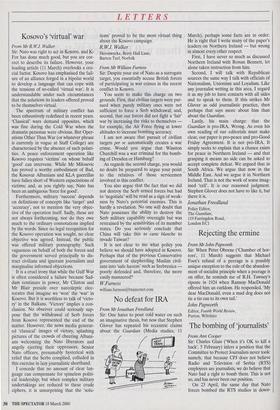LETTERS Kosovo's 'virtual' war
From Mr R.W.J. Walker Sir: Nato was right to act in Kosovo, and K- For has done much good, but you are cor- rect to describe its failure. However, your leading article (11 March) overlooks a cru- cial factor. Kosovo has emphasised the fail- ure of an alliance forged in a bipolar world to develop a language that can cope with the tensions of so-called 'virtual war'. It is understandable under such circumstances that the solutions its leaders offered proved to be themselves virtual.
The spectrum of military conflict has been exhaustively redefined in recent years. `Classical' wars demand opposites, which was fine during the Cold War when the dramatis personae were obvious. But Oper- ations Other Than War (or whatever phrase is currently in vogue at Staff College) are characterised by the absence of such polari- ties. A peace enforcement operation like Kosovo requires 'victims' on whose behalf `good' can intervene. While Mr Milosevic has proved a worthy embodiment of Bad, the Kosovar Albanians and KLA guerrillas have fallen short of Western expectations of victims; and, as you rightly say, Nato has been an ambiguous 'force for good'.
Furthermore, military 'success' depends on definitions of concepts like 'target' and `accuracy', not to mention the very objec- tive of the operation itself. Sadly, these are not always forthcoming, nor do they owe much to the ordinary connotations implied by the words. Since no legal recognition for the Kosovo operation was sought, no clear objective was agreed. Instead, the public was offered military pornography. Such vagueness on behalf of both the forces and the government served principally to dis- tract civilians and ignorant journalists and marginalise informed objections.
It is a cruel irony that while the Gulf War is often considered a failure because Sad- dam continues in power, Mr Clinton and Mr Blair preside over narcoleptic elec- torates that imagine we 'won' the 'war' in Kosovo. But it is worthless to talk of 'victo- ry' in the Balkans. 'Victory' implies a con- clusion. No observer could seriously sup- pose that the withdrawal of Serb forces from Kosovo represented the end of the matter. However, the news media generat- ed 'classical' images of victory, splashing pictures of the crowds of cheering Albani- ans welcoming the Nato liberators and angrily ejecting their oppressors. Senior Nato officers, presumably hysterical with relief that the Serbs complied, colluded in this exercise in lazy journalistic shorthand.
I concede that no amount of clear lan- guage can compensate for spineless politi- cal leadership; but when complex military undertakings are reduced to these crude ciphers, it is unsurprising that the `solu- tions' proved to be the most virtual thing about the Kosovo campaign.
R.W.J. Walker
Heronwycke, Berry Hall Lane, Barton Turf, Norfolk
From Mr William Furness Sir: Despite your use of Nato as a surrogate target, you essentially accuse British forces of participating in war crimes in the recent conflict in Kosovo.
You seem to make this charge on two grounds. First, that civilian targets were pur- sued when purely military ones were not sufficient to force a Serb withdrawal; and, second, that our forces did not fight a 'fair' war by increasing the risks to themselves for example, the Air Force flying at lower altitudes to increase bombing accuracy.
I am not aware that pursuit of civilian targets per se automatically creates a war crime. Would you argue that Winston Churchill was a war criminal for the bomb- ing of Dresden or Hamburg?
As regards the second charge, you would no doubt be prepared to argue your point to the relatives of those servicemen involved in this conflict.
You also argue that the fact that we did not destroy the Serb armed forces but had to 'negotiate' will be read as a sign of weak- ness by Nato's potential enemies. This is hardly a revelation. No one will doubt that Nato possesses the ability to destroy the Serb military capability overnight but was restrained by the sensitivities of its member states. Do you seriously conclude that China will take this as carte blanche to invade Taiwan?
It is not clear to me what policy you believe we should have adopted in Kosovo. Perhaps that of the previous Conservative government of shepherding Muslim civil- ians into 'safe havens' such as Srebrenica poorly defended and, therefore, the more easily massacred?
W.Furness
william.furness@btinternet.com


















































































 Previous page
Previous page